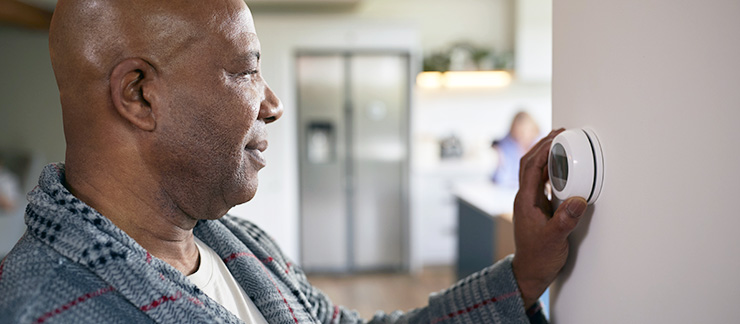
Keep Seniors Safe and Cool in Extreme Heat
As heat waves strike communities during the dog days of summer, people of all ages frantically look for ways to cool off. Family caregivers of seniors experience even more pressure and stress. They need to keep their older loved ones safe and comfortable during periods of soaring temperatures. Teamwork and a bit of extra planning are sometimes required.
Seniors and Heat-Related Illness
Long exposure to high outdoor temperatures isn’t safe for anyone, especially older adults at risk of suffering heat-related illness. In fact, the National Institute on Aging reports most people who die of heat-related illnesses are older than 50.
Due to normal aging-related changes, older adults are sometimes unable to recognize when they are becoming overheated. They may not adapt to changing temperatures or unable to exert themselves the same way as when they were younger.
Seniors can be at risk for heat-related illness due to certain health problems, including:
- Cardiovascular issues
- Changes in skin and sweat glands caused by normal aging
- Medications that make it harder for the body to stay cool
- Being overweight or underweight
- Consuming alcoholic beverages
- Health conditions that cause weakness or elevated body temperatures
Older adults with dementia, speech challenges, or other health conditions may have difficulty communicating they feel overheated. Watch for symptoms of excessive heat exposure, including:
- Dizziness
- Weakness
- Muscle cramps
- Swelling of ankles or feet
- Problems with coordination
- Nausea
- Cold, clammy skin
- Rapid pulse
Some symptoms can indicate heat stroke, which requires immediate medical attention. Symptoms of heat stroke that require emergency care include:
- Fainting
- Confusion, agitation, or mood swings
- Body temperature over 104°F
- Dry, flushed skin
- Rapid, strong pulse or slow, weak pulse
- Lack of sweating
Keeping Seniors Safe in a Heat Wave
You may not be able to control the temperature outside, but here are a few things you can do to keep your senior loved ones safe during a heat wave:
- Check up
Check up on your senior often to monitor if they are having any symptoms of heat-related illness. Family members, friends, and neighbors can work together to coordinate a schedule of in-person visits. When you cannot check on your loved one, a senior care provider from Visiting Angels can make routine visits to provide you peace of mind.
- Hydrate
Make sure seniors are drinking plenty of water and limit intake—or avoid—caffeine and alcohol. Seniors who need to limit liquids due to a medical condition should ask their doctor how to handle hydration when temperatures are high. An in-home caregiver will make sure your older loved one is consuming plenty of water.
- Stay indoors
Staying indoors during the hottest part of the day — typically between noon and 4 pm — can help lower the risk of heat-related illness. An in-home caregiver can assist with planning safe outdoor activities, appointments, and errands when temperatures are lower.
- Keep the home cool
Ensure air conditioning and fans are in good working order, and verify seniors understand how to operate them. Keep blinds, shades and curtains closed during the hottest part of the day, and limit the use of appliances, such as ovens, that may throw off excess heat.
- Spend time in cool locations
If your older loved one does not have air conditioning or fans at home, a Visiting Angels caregiver can ensure they are spending time in a cool place, such as the mall, library, church, senior center, or a family member’s house.
- Wear cool clothing
Older adults sometimes wear sweaters and long pants during hot weather because of problems with body temperature regulation. This can contribute to heat-related illness. An in-home caregiver will make sure your senior is wearing weather-appropriate, lightweight clothing.
- Keep the car cool
Check the air conditioning in your older loved one’s car to make sure it is working properly. Never leave an older loved one in the car while you run into a store without opening the windows.
- Use sun protection
Older adults may be more sensitive to sun exposure. If your senior must be out in the sun, they should wear sunscreen, sunglasses, and a hat — and caregivers should be on the lookout for signs of heat-related illness.
In-Home Care Support from Visiting Angels
Helping your older loved one through a heat wave safely can be challenging, but help is available. Visiting Angels’ caregivers are trained to keep seniors safe during periods of high temperatures and know how to spot troublesome symptoms. When you can’t be there to help your loved one beat the heat, a Visiting Angels caregiver will go the extra mile to make sure they stay cool.
Our Visiting Angels’ care coordinators are available to discuss your loved one’s home care needs via a free care consultation.


